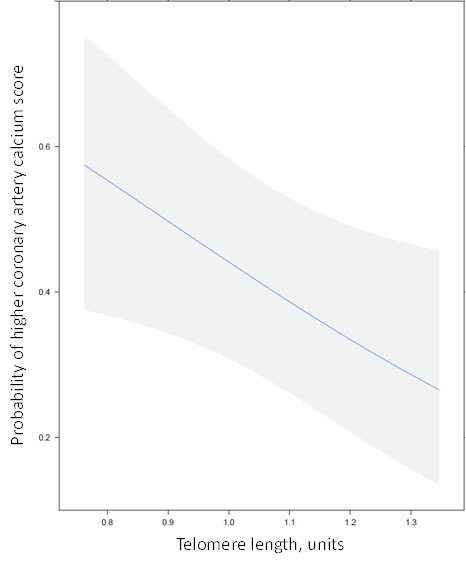Session Information
Session Type: ACR Poster Session B
Session Time: 9:00AM-11:00AM
Background/Purpose: Telomeres protect against DNA damage and
shorten with each cell division; their length may be a marker of cardiovascular
and overall biological aging. Patients with rheumatoid arthritis (RA) have
accelerated cardiovascular disease resulting in early mortality. The
relationship between telomere length and atherosclerosis in RA is not known. We
examined the hypothesis that reduced telomere length is associated with
increased coronary atherosclerosis in RA.
Methods: We performed a cross-sectional study in 145 patients with
RA and 87 control subjects frequency matched
for age, race and sex. Coronary artery calcium score, a measure of coronary
atherosclerosis, was determined by non-contrast cardiac computed tomography.
Telomere length was measured from DNA extracted from whole blood, using
real-time quantitative polymerase chain reaction and expressed as the ratio of telomeric repeats to a single-copy gene (T/S ratio). The
associations between telomere length and coronary artery calcium score and
disease activity (DAS28) were assessed with Spearman correlation, proportional
odds logistic regression, and linear regression adjusting for age, race and sex
in patients with RA.
Results: Telomere length was significantly inversely correlated with
age in patients with RA (rho=-0.37, P<0.001) and control subjects
(rho=-0.39, P=0.001). Among patients with RA, for every interquartile range
(IQR) decrease in telomere length (T/S ratio), the odds of higher coronary
artery calcium score increased by 38% (95% CI: 4, 60%), after adjusting for
age, race and sex (P adjusted= 0.03) (Figure).
Telomere length was not associated with DAS28 (P adjusted= 0.17).
Telomere length was not significantly different in patients with RA (median
[IQR]: 1.02 units [0.9, 1.11 units]) compared to control subjects (1.05 units
[0.95, 1.17 units]; P= 0.10).
Conclusion: Telomere length is inversely associated with coronary
artery calcium score independent of age, race and sex in patients with RA.
To cite this abstract in AMA style:
Ormseth MJ, Solus JF, Oeser AM, Bian A, Gebretsadik T, Shintani A, Raggi P, Stein CM. Telomere Length and Cardiovascular Risk in Rheumatoid Arthritis [abstract]. Arthritis Rheumatol. 2015; 67 (suppl 10). https://acrabstracts.org/abstract/telomere-length-and-cardiovascular-risk-in-rheumatoid-arthritis/. Accessed .« Back to 2015 ACR/ARHP Annual Meeting
ACR Meeting Abstracts - https://acrabstracts.org/abstract/telomere-length-and-cardiovascular-risk-in-rheumatoid-arthritis/

